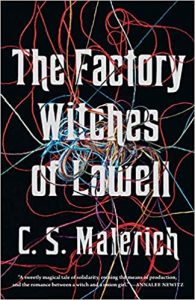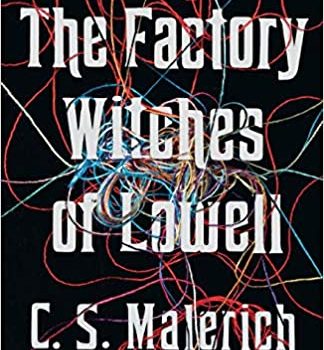Colleen Mondor Reviews The Factory Witches of Lowell by C.S. Malerich
 The Factory Witches of Lowell, C.S. Malerich (Tor.com Publishing 978-1250756565, $14.99, 128pp, tp) November 2020.
The Factory Witches of Lowell, C.S. Malerich (Tor.com Publishing 978-1250756565, $14.99, 128pp, tp) November 2020.
In the early 19th century, Lowell MA was known for its thriving textile mill industry. Unlike neighboring Rhode Island, the Lowell system developed a workforce made primarily of young women, all of whom worked 80 hours a week, lived in company-owned dormitories, and, because of their gender, earned a lower salary than men. Historically, there were strike attempts by these women in the 1830s, but unfortunately, as they could be easily replaced by others desperate for employment, it was difficult for organizers to press their case. Thus while Lowell is easily presented as a successful example of capitalism from the owners’ perspective, it was a tragedy for many of the employees. For author C.S. Malerich, Lowell’s complex story provided an opportunity to combine New England’s deep witchcraft mythology with the dark truth behind its mills. The result is the absolutely sublime novel, The Factory Witches of Lowell, which is most definitely one of my favorite reads this year.
In the book’s opening pages, readers meet a group of young working women, led by friends Judith and Hannah, who have decided to cast a spell of solidarity. Judith is no stranger to strikes and her focus is on holding the group together as they protest not only a recent rent increase but also seek to improve working conditions. Hannah has a gift for witchcraft and it is her power that fuels the spell. In the pages that follow, the initial group is joined by others, but the mill owner’s agent begins to suspect that something supernatural might be at work. As he closes in on the two ringleaders, great pressure is brought to bear on all the girls to give them up and drop the strike. That’s when Judith realizes it will take more than just the girls to shut down the mills, and she and Hannah turn to something far more powerful that has its own tangled history with Lowell.
As witchcraft stories go, The Factory Witches of Lowell provides the most significant of necessary elements with ease: the mill girls are clearly a group of determined women willing to risk everything to stand up against a patriarchy that refuses to afford them any respect. Judith and Hannah are formidable protagonists doing everything they can to save themselves and their friends, and all of the girls have moments bringing home the “we are stronger together than apart” theme. Malerich’s late plot twist to save the strike is a nice surprise (with another excellent historic note), and the narrative zips along at a wicked pace. But none of that is why I love this book so much. The Lowell story, the real story, is horrible. It is part and parcel of our country’s long, ugly history in which workers, especially female workers, were treated with contempt, neglect, and outright endangerment by management and owners who cared little if they lived or died. Lowell was a particularly fraught part of this history, yet it remains overlooked. Young women toiled there, suffered there, and died there for far too long. If only they were witches, if only they could have called forth a power that the author effectively asserts was rightfully theirs to claim.
The history that Malerich weaves into this tightly written fantasy (only 128 pages!) is impressive, particularly as she writes about the illnesses that affected the girls. It is likely few readers are aware of how the workers were forced to engage in “the Kiss of Death,” sucking cotton lint into their lungs, or the damage they suffered by inhaling whale-oil smoke and cotton dust. Even more disturbing is how history has glossed over the way the system diminished the mill girls. As Malerich writes, “every season, they worked longer and faster, had to tend more looms to make the same wages, and to obey heavier rules – they were becoming less free, not more.”
New England holds many stories rife for literary payback, and thank goodness Malerich chose to pick this one. With The Factory Witches of Lowell, she throws fire onto a historical footnote and demands notice for thousands of forgotten young women. They are lost in archives that see far too few visitors, but Malerich heard them calling from the grave. Her novel is a hallelujah that gives the mill girls the mighty reckoning they richly deserve. “I see you,” she tells them with this spellbinding story, “I see you and I won’t let anyone forget.”
Colleen Mondor, Contributing Editor, is a writer, historian, and reviewer who co-owns an aircraft leasing company with her husband. She is the author of “The Map of My Dead Pilots: The Dangerous Game of Flying in Alaska” and reviews regularly for the ALA’s Booklist. Currently at work on a book about the 1932 Mt. McKinley Cosmic Ray Expedition, she and her family reside in the Pacific Northwest and Alaska. More info can be found on her website: www.colleenmondor.com.
This review and more like it in the November 2020 issue of Locus.
 While you are here, please take a moment to support Locus with a one-time or recurring donation. We rely on reader donations to keep the magazine and site going, and would like to keep the site paywall free, but WE NEED YOUR FINANCIAL SUPPORT to continue quality coverage of the science fiction and fantasy field.
While you are here, please take a moment to support Locus with a one-time or recurring donation. We rely on reader donations to keep the magazine and site going, and would like to keep the site paywall free, but WE NEED YOUR FINANCIAL SUPPORT to continue quality coverage of the science fiction and fantasy field.
©Locus Magazine. Copyrighted material may not be republished without permission of LSFF.







